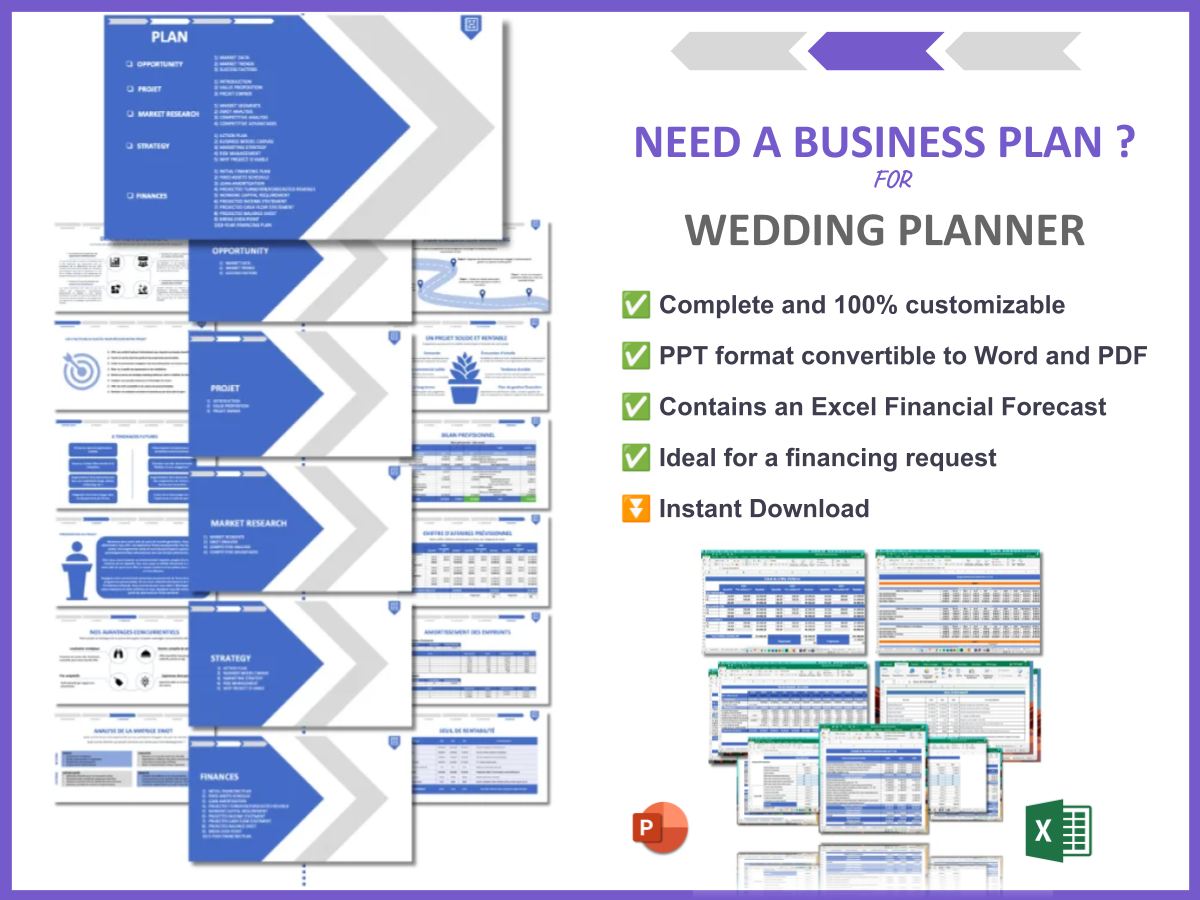Are you thinking about starting a wedding planner business? You’re not alone! The wedding industry is booming, with an estimated growth rate of over 30% in recent years. This means that now is a fantastic time to dive in and turn your passion for organizing events into a lucrative career. In this article, we’ll explore how to start a wedding planner business, guiding you through the essential steps to set yourself up for success.
Before you dive into the logistics, take a moment to reflect on what drives your passion for wedding planning. Is it the creative aspect, the organizational skills, or the joy of making couples’ dreams come true? Narrowing down your niche can help you stand out in this competitive market. Here are a few niches to consider:
- Destination weddings
- Budget-friendly weddings
- Luxury weddings
Your unique angle will not only attract clients but also define your brand. For instance, if you love travel, specializing in destination weddings could be your perfect fit!
1. Identify Your Passion and Niche in Wedding Planning
To effectively carve your path in the wedding planning industry, you need to identify your passion and niche. Ask yourself the following questions:
- What aspects of wedding planning excite you the most?
- Are there specific types of weddings that resonate with you?
- Who do you envision as your ideal client?
Understanding these elements will help you create a targeted marketing strategy and ensure that your services align with your interests.
2. Research the Wedding Planning Market and Your Competition
Understanding the landscape of the wedding planning industry is crucial. Start by researching local competitors. What services do they offer? How do they market themselves? This can help you identify gaps in the market that you can fill. Here’s a simple table to help you organize your findings:
| Competitor | Services Offered | Price Range |
|---|---|---|
| Company A | Full-service planning, day-of coordination | $3,000 – $10,000 |
| Company B | Destination weddings, elopements | $2,500 – $8,000 |
| Company C | Budget weddings, DIY coordination | $1,500 – $5,000 |
Analyzing your competition can reveal valuable insights into pricing strategies and service offerings. It’s also a chance to see what’s working for them and what’s not, giving you a clear advantage as you develop your own business model.
In addition, consider reaching out to clients who have recently used wedding planning services. Their feedback can provide invaluable insights into what they liked, what they didn’t, and what they wish they had seen. This direct information can help you shape your offerings to better meet potential clients’ needs.
3. Create a Comprehensive Business Plan for Your Wedding Planning Business
One of the first steps in how to start a wedding planner business is drafting a detailed business plan. This document should outline your mission, services, target market, and financial projections. A solid business plan will not only guide your decisions but also help you secure funding if needed. Here’s a quick checklist of what to include in your business plan:
- Executive Summary: A brief overview of your business.
- Market Analysis: Insights into your target market and competition.
- Services Offered: Detailed descriptions of your services.
- Marketing Strategy: How you plan to attract clients.
- Financial Projections: Estimated income and expenses.
I recommend checking out this business plan template for Wedding Planner. It’s super detailed and can save you a ton of time!
4. Decide on the Legal Structure for Your Wedding Planning Business
Choosing the right legal structure is essential for protecting yourself and your business. There are several options to consider, each with its own advantages and disadvantages:
| Legal Structure | Pros | Cons |
|---|---|---|
| Sole Proprietorship | Easy to set up, full control | Unlimited personal liability |
| Limited Liability Company (LLC) | Limited liability, flexible management | More paperwork and fees |
| Corporation | Limited liability, easier to raise capital | Complex structure, double taxation |
Consult with a legal professional to determine which structure fits your needs best. For many aspiring wedding planners, starting as a sole proprietor is a common choice due to its simplicity. However, as your business grows, you might want to consider forming an LLC to protect your personal assets.
In summary, selecting the right legal structure is not just about current needs; it’s about planning for future growth and ensuring you have the right protections in place. Take your time, do your research, and make an informed decision that aligns with your long-term goals.
5. Secure Funding and Financial Resources for Your Wedding Planning Business
Starting a wedding planning business may require some initial investment. Consider your funding options carefully, as securing the right financial resources can set you up for success. Here are some common ways to fund your business:
- Personal Savings: Using your savings can be a straightforward way to fund your startup costs without incurring debt.
- Small Business Loans: Many banks and credit unions offer loans specifically for small businesses. Make sure to have a solid business plan in place to present to lenders.
- Crowdfunding: Platforms like Kickstarter or GoFundMe can help you raise funds by showcasing your business idea to potential backers.
It’s essential to weigh the pros and cons of each funding source. For example, while personal savings may not incur interest, they do pose a risk to your personal finances.
| Funding Source | Pros | Cons |
|---|---|---|
| Personal Savings | No debt incurred | Risking personal finances |
| Small Business Loans | Access to more capital | Debt obligations |
| Crowdfunding | Engages community support | Not guaranteed success |
Regardless of the funding option you choose, having a clear understanding of your financial needs and creating a budget will help ensure that your wedding planning business starts on the right foot.
6. Register Your Wedding Planning Business
Once you’ve decided on a name and legal structure, it’s time to register your business. This makes it official and allows you to operate legally. The registration process can vary depending on your location, but here are the general steps to follow:
- Choose a Business Name: Make sure it’s unique and reflects your brand.
- Check Availability: Verify that your chosen name isn’t already in use by another business.
- Register with Local Authorities: File the necessary paperwork with your local government or state agency.
- Obtain an EIN: If you plan to hire employees or form an LLC, you’ll need an Employer Identification Number (EIN) from the IRS.
Registering your business is a crucial step in how to start a wedding planner business. It not only legitimizes your venture but also opens the door to potential funding opportunities and partnerships.
By following these steps, you’ll ensure that your business is compliant with local laws and regulations, allowing you to focus on what you do best—planning unforgettable weddings!
7. Obtain Necessary Licenses and Permits for Your Wedding Planning Business
Depending on your location, you may need specific licenses and permits to operate legally as a wedding planner. This step is crucial to ensure that you comply with local regulations and avoid any legal issues down the road. Here’s a breakdown of what you might need:
- Business License: Required in most areas to legally operate a business.
- Vendor Permit: Some locations require this if you will be setting up vendor booths at events.
- Sales Tax Permit: If you are selling any products or services directly to clients, you may need to collect sales tax.
To find out what specific licenses are required in your area, visit your local government’s website or contact a local business development office. They can provide you with detailed information tailored to your location.
Here’s a quick checklist to ensure you have everything covered:
- Research local regulations and requirements.
- Gather necessary documentation (e.g., proof of business registration).
- Submit applications for required licenses and permits.
- Keep copies of all licenses and permits on file.
8. Apply for Business Insurance Coverage for Your Wedding Planning Business
Insurance is crucial to protect yourself against potential liabilities. As a wedding planner, you will be responsible for ensuring that events run smoothly, but unexpected situations can arise. Here are some types of insurance coverage you should consider:
- General Liability Insurance: Protects you against claims of bodily injury or property damage.
- Professional Liability Insurance: Covers you in case of negligence or failure to deliver services as promised.
- Property Insurance: Protects your business assets, such as equipment and supplies.
When looking for insurance, it’s essential to compare quotes from different providers. Make sure to understand what each policy covers and any exclusions that may apply. This will help you select the best coverage for your specific needs.
| Type of Insurance | Coverage | Average Cost |
|---|---|---|
| General Liability | Bodily injury, property damage | $500 – $1,500 annually |
| Professional Liability | Negligence, failure to deliver | $300 – $1,200 annually |
| Property Insurance | Equipment and supplies | $400 – $1,000 annually |
Investing in the right insurance coverage is a critical step in how to start a wedding planner business. It not only safeguards your financial future but also instills confidence in your clients, knowing that you are prepared for any situation that may arise.
9. Set Up Your Financial Management Systems for Your Wedding Planning Business
Establishing a solid financial management system is key to tracking your income and expenses effectively. As a wedding planner, you’ll want to ensure that your finances are organized from the very beginning. Here are some steps to help you set up your financial management systems:
- Choose Accounting Software: Select software that fits your business needs, like QuickBooks or FreshBooks, which can help you manage invoices, expenses, and financial reports.
- Open a Separate Business Bank Account: Keeping your personal and business finances separate simplifies bookkeeping and tax preparation.
- Set Up a Budget: Create a budget that outlines your expected income and expenses. This will help you stay on track financially.
Here’s a simple table to illustrate common expenses you might encounter:
| Expense Category | Examples | Estimated Monthly Cost |
|---|---|---|
| Marketing | Website, social media ads | $200 – $500 |
| Office Supplies | Stationery, business cards | $50 – $100 |
| Insurance | General and professional liability | $50 – $150 |
By implementing a robust financial management system, you’ll be able to monitor your cash flow, prepare for tax season, and make informed decisions that will help your wedding planning business thrive.
10. Establish Your Brand Identity for Your Wedding Planning Business
Your brand is how clients perceive you, and establishing a strong brand identity is essential in the competitive world of wedding planning. A well-defined brand will help you attract your target market and differentiate yourself from competitors. Here are some key elements to consider:
- Logo Design: Create a memorable logo that reflects your style and personality.
- Brand Colors: Choose a color palette that resonates with your target audience and aligns with your brand’s message.
- Tagline: Develop a catchy tagline that encapsulates what you offer and sets the tone for your services.
In addition, consistency is crucial. Ensure that your branding is cohesive across all platforms, including your website, social media, and marketing materials. This not only builds recognition but also fosters trust among potential clients.
Consider creating a brand style guide that outlines your brand’s voice, visual elements, and messaging. This guide will serve as a reference for all your marketing efforts, ensuring that your brand remains consistent and recognizable.
In summary, establishing a strong brand identity is a vital step in how to start a wedding planner business. It sets the foundation for your marketing efforts and helps you connect with your audience on a deeper level.
11. Develop a Professional Website for Your Wedding Planning Business
In today’s digital age, a professional website is a must for any wedding planner. Your website serves as the first impression for potential clients and a platform to showcase your services. Here are some essential elements to include:
- Portfolio: Display high-quality images from past weddings you have planned. This visual representation is crucial for attracting new clients.
- Client Testimonials: Include positive reviews from previous clients to build credibility and trust.
- Contact Information: Make it easy for clients to reach you by providing a contact form, email address, and phone number.
Consider using a user-friendly website builder like WordPress, Wix, or Squarespace, which offer templates specifically designed for service-based businesses. Here’s a quick checklist to ensure your website is effective:
- Ensure it is mobile-friendly.
- Optimize for search engines (SEO).
- Include a blog for sharing wedding planning tips and ideas.
12. Market and Advertise Your Wedding Planning Business
Marketing is essential to attract clients to your wedding planning business. Utilize various strategies to get your name out there:
- Social Media Marketing: Platforms like Instagram and Pinterest are visually driven, making them perfect for showcasing your work.
- Email Marketing: Build an email list and send out newsletters with tips, updates, and special offers.
- Networking: Attend local wedding fairs, join bridal shows, and connect with other vendors to establish relationships that can lead to referrals.
Here’s a simple table to illustrate potential marketing costs:
| Marketing Channel | Estimated Monthly Cost | Expected Reach |
|---|---|---|
| Social Media Ads | $100 – $500 | Hundreds to thousands of impressions |
| Email Marketing | $20 – $200 | Targeted list of subscribers |
| Wedding Fairs | $200 – $1,000 | Direct interaction with potential clients |
By implementing a multi-channel marketing strategy, you’ll maximize your reach and attract a diverse range of clients.
13. Assemble Your Team for Your Wedding Planning Business
As your wedding planning business grows, you may want to hire additional staff or collaborate with other vendors. Building a reliable team will allow you to take on more clients and expand your services. Here are some roles to consider:
- Assistant Planners: Help with logistics and coordination on the day of the event.
- Marketing Specialist: Manage your online presence and promotional efforts.
- Administrative Support: Handle paperwork, scheduling, and client communications.
When assembling your team, look for individuals who share your vision and values. Conduct interviews to assess their skills and fit within your company culture. It’s also beneficial to establish clear roles and responsibilities to ensure smooth operations.
In conclusion, building a strong team is vital in how to start a wedding planner business. With the right people by your side, you can create unforgettable experiences for your clients and grow your business to new heights.
Conclusion
Starting your own wedding planner business can be an incredibly rewarding venture, both personally and financially. By following the steps outlined in this guide, from identifying your niche to assembling a dedicated team, you can set yourself up for success in this vibrant industry. Remember, the key to thriving in the wedding planning business lies in your passion, organization, and ability to connect with clients.
To further enhance your knowledge and skills, I encourage you to check out these additional resources:
- How to Create a SWOT Analysis for Wedding Planner
- How to Build a Wedding Planner Marketing Plan? With Example
With dedication and the right strategies, you can turn your dream of becoming a successful wedding planner into a reality!
FAQ
- What qualifications do I need to become a wedding planner?
While formal education is not mandatory, having a background in event planning, hospitality, or business can be beneficial. Consider taking courses specifically focused on wedding planning to enhance your skills. - How much does it cost to start a wedding planning business?
The startup costs can vary significantly depending on your location and services offered, but you should expect to invest anywhere from $2,000 to $10,000 for essentials such as licenses, insurance, and marketing. - How do I find clients as a new wedding planner?
Networking is crucial. Attend wedding fairs, collaborate with vendors, and leverage social media platforms to showcase your work and connect with potential clients. - What services should I offer as a wedding planner?
Services can range from full-service planning to day-of coordination. Consider offering packages that include venue selection, vendor coordination, and budget management. - Is it necessary to have insurance for my wedding planning business?
Yes, obtaining insurance is essential to protect yourself against potential liabilities. General and professional liability insurance can safeguard your business from unexpected events. - How can I differentiate myself from other wedding planners?
Finding a niche, such as eco-friendly weddings or destination events, can help you stand out. Additionally, offering exceptional customer service and personalized experiences will set you apart. - What are some common challenges faced by wedding planners?
Common challenges include managing client expectations, dealing with last-minute changes, and ensuring all vendors deliver quality service. Effective communication and organization can help mitigate these issues. - How do I create a wedding planning business plan?
A solid business plan should include your mission, target market, services offered, marketing strategies, and financial projections. Following a template can simplify the process. - What marketing strategies are effective for wedding planners?
Utilize social media marketing, content marketing (like blogs), and partnerships with local vendors. Email marketing can also be a powerful tool to keep potential clients engaged. - Do wedding planners need to be certified?
Certification is not required, but it can enhance your credibility and knowledge. Consider obtaining certification from reputable organizations if you want to strengthen your credentials.







